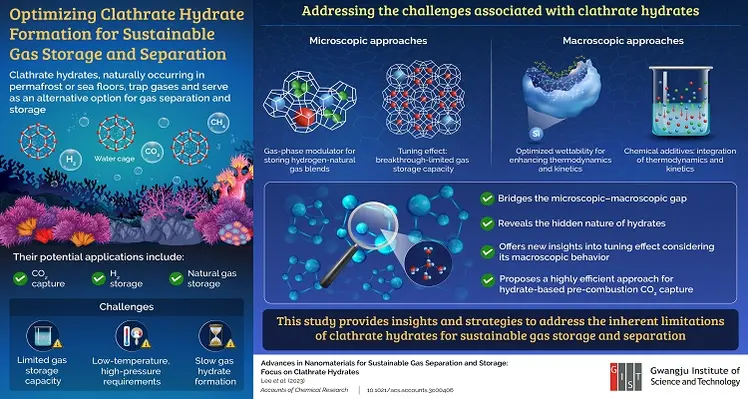Researchers at South Korea’s Gwangju Institute of Science and Technology have come up with new insights into clathrate hydrates, fostering sustainable gas storage and separation for carbon capture, storage, and industrial emission reduction
Clathrate hydrates possess assorted nano-sized water cages, which makes them promising for various separation processes, such as capture of carbon dioxide (CO2) before and after combustion, storage of hydrogen gas, transportation of natural gas, desalination of wastewater, and more. However, using them in real-world applications is still a significant challenge, as they have limited gas storage capacities and slow formation rates that require high pressure and low temperature conditions.
In a new study led by Professor Youngjune Park from the Gwangju Institute of Science and Technology in Korea, a team of researchers has comprehensively reviewed recent research findings, including their own, that address these myriad challenges associated with clathrate hydrates. According to Professor Park ,“By exploring the untapped potential of clathrate hydrates, we have effectively mitigated these limitations and provided efficient hydrogen (H2) storage solutions through the introduction of hydrogen-natural gas blends into clathrate hydrates.” Their study was made available online on 7 November 2023 and published in the journal Accounts of Chemical Research on 21 November 2023.
This study helps to advance the untapped potential of gas hydrates by bridging macroscopic and microscopic properties, and the exploration of their hidden nature opens various potential applications. These encompass efficient techniques for pre- and post-combustion CO2 capture using hydrates, demonstrating practical and economic viability. Subsequently, this can reduce carbon dioxide emissions from power plants and thereby play a role in mitigating climate change in the long run and making carbon capture more affordable.
These insights will also help to increase the storage and transportation capacity of hydrogen and natural gas, which is crucial for industries involved in energy applications using these gases.
“This research has significant long-term potential for the gas storage and separation industry, particularly in achieving carbon neutrality. Our findings offer crucial insights for developing clathrate hydrate-based technologies for hydrogen storage and carbon dioxide separation, essential for a future low-carbon society,” said Prof. Park.
Other sustainable applications include gas separation processes, as well as desalination processes, thereby providing an avenue for the treatment of water and other substances in industries requiring large-scale processing. Clathrates could also contribute to the storage and transportation of gases produced in renewable energy processes, such as biogas or syngas from biomass or waste.








